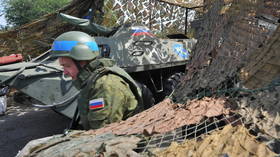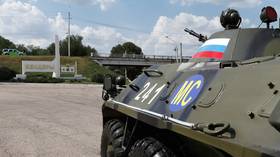Moldova calls for withdrawal of Russian troops

The Moldovan Foreign Ministry on Friday called for the withdrawal of Russian peacekeeping troops from the breakaway region of Transnistria in response to the remarks of a senior official of the unrecognized republic.
In an interview with RIA Novosti on Thursday, Transnistrian Foreign Minister Vitaly Ignatiev said that the region was worried about “destructive demarches” from Chisinau, and accused the Moldovan authorities of interfering with the rotation of Russian peacekeepers.
The Moldovan Foreign Ministry denied the accusations, stressing that the rotation of Russian peacekeepers is carried out in accordance with “a mechanism established with the aim of avoiding risks and ensuring a coordinated movement of contingent personnel.”
Transnistria broke away from Moldova in the early 1990s, shortly after the collapse of the Soviet Union. The region maintains a close relationship with Moscow, with Russian peacekeepers stationed there and most of the local population holding Russian citizenship.
Responding to Russia’s claims about the recent detention of Russian peacekeepers at Chisinau airport – something that Moscow described as an “unfriendly” action – the Moldovan ministry stressed that only some Russian servicemen had been prevented from entering the country’s territory due to their non-compliance “with the criteria established in the mechanism.”
“In this context, the Ministry of Foreign Affairs and European Integration reiterates the position of the Moldovan authorities regarding the necessity of the unconditional resumption of the process of withdrawal of Russian troops and ammunition depots from our country,” the statement reads.
Vladimir Dzhabarov, the deputy head of the international affairs committee of the Russian parliament’s upper chamber, has previously said that Russia will not allow the withdrawal of Russian peacekeeping forces from Transnistria.
“Any attempts by irresponsible politicians in Chisinau to question this role of peacekeepers, to push through a change in the format of the peacekeeping operation with the withdrawal of Russian troops from the region will lead to destabilization and the inevitable resumption of bloodshed,” he said.
Meanwhile, Transnistria’s foreign minister has made some other controversial statements over the last two days. He told RIA Novosti that the region would seek independence with subsequent accession to Russia in accordance with 2006 referendum results.
Kremlin spokesman Dmitry Peskov said that he couldn’t comment on Ignatiev’s statement as he was not aware “which processes it was related to.”
At a press conference on Friday, Ignatiev clarified that the possibility of Transnistria’s accession to Russia was “not being discussed” at present as this was a matter that required political preparation. However, he stressed that the decision made in 2006, when the region’s residents supported “the independent development of Transnistria and the subsequent free entry into the Russian Federation,” remains relevant.
Transnistria, officially known as the Pridnestrovian Moldavian Republic (PMR), is an unrecognized state located along a narrow strip of land between the Dniester River and the Ukrainian border in the eastern part of Moldova.













